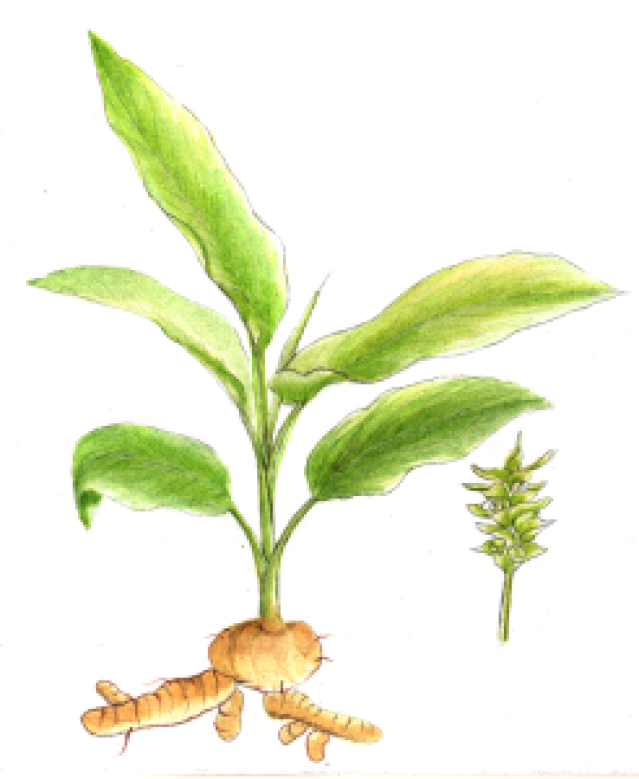Herbal remedies are based on the principle of strengthening wellness and preventing diseases rather than curing sickness. It directs us to resist the diseases through our food habits and life styles and herbal remedy use. Hippocrates stressed,
“Let your food be your medicine”
Over the last several years, there has been increasing interest in Turmeric and its medicinal properties. The rhizomes or roots of this plant look like ginger but are smaller and an orange color and are used as medicine and in natural remedies. The rhizomes are boiled, dried and then powdered.

This powder is used for medicinal and culinary purposes. This turmeric herb has occupied the shelves of every Indian kitchen for 6000 years and is considered the king of the kitchen. It has a pungent and bitter taste. It is used daily in cooking. Apart from cooking, it is also used as a beauty aid and as a dye.
Turmeric (Curcuma Longa) belongs to Zingiberaceae Family and is a perennial plant that grows 3 to 5 feet high in the tropical regions. Ayurveda appreciates the medicinal qualities and yellow color of Turmeric.
We can particularly praise the medicinal qualities of Turmeric, which finds its place in many herbal preparations related to aiding inflammation, liver and skin disorders. The active chemical component of Turmeric is Curcumin.
Curcumin is a strong antioxidant and reduces inflammation by reducing histamine levels.
- Curcumin protects the liver,
- reduces cholesterol,
- prevents internal blood clotting,
- prevents heart attacks,
- protects from liver tissue damages and disorders,
- widely used in skin treatments,
- treats respiratory issues,
- purifies the blood,
- enhances the complexion
Turmeric is very safe. But special precautions should be taken in persons who have gallstones, hyperacidity, stomach ulcers and obstructive jaundice.
Effects of Turmeric—-
On The Liver
- It is recommended that this golden herb can purify blood and prevent it from clotting.
- It is used extensively to protect the liver from toxins and microbes.
- Turmeric increases the secretion of bile, promotes the free flow of bile.
- This herb can be used to overcome toxic effects of alcohol on the liver.
- This reduces cholesterol and protects the heart.
- 1 teaspoon of Turmeric with warm water should rejuvenate the liver and expel toxins out of it.
On The Respiratory System
- Turmeric is very effective in bronchitis, productive cough and asthma.
- One spoon of turmeric boiled in milk should be taken with a spoon of pure ghee for conditions like bronchitis, asthma and productive cough.
- This gives very good relief and as an expectorant for excessively produced mucous in the lungs.
On Ageing
- The antioxidant properties of turmeric give us young looks and make us feel young.
- It reduces inflammation in joints, protects the heart, reduces cholesterol and keeps us very healthy.
On Diabetes
- It is widely used in Ayurvedic preparations for Diabetes.
- It lowers the blood sugar and increases glucose metabolism.
On the Uterus
- It initiates a regular menstrual cycle and reduces menstrual cramps.
On the Skin
- Blood nourishes the skin and it is known fact that pure blood always keeps the skin glowing and radiant.
- Turmeric purifies the blood, nourishes skin and gives it a healthy natural glow and radiance.
- A traditional face pack used in India consists of gram flour, pure turmeric powder, milk, and honey.
- This reduces inflammation of the skin, smoothens it and prevents many skin ailments.
On Stomach and Intestines
- Turmeric enhances digestion, normalizes metabolism and expels intestinal parasites
On Wounds
- Turmeric accelerates the healing process and readily reduces pain and inflammation.
- A thick paste of Turmeric applied on wounds acts as an excellent antibiotic and anti inflammatory.
On Health
- Turmeric purifies and cleans the body.
- It is a tailor made herb for those who are health conscious.
- It increases the flexibility of muscles, reduces inflammation in muscles and joints and helps to perform exercise with confidence and ease.